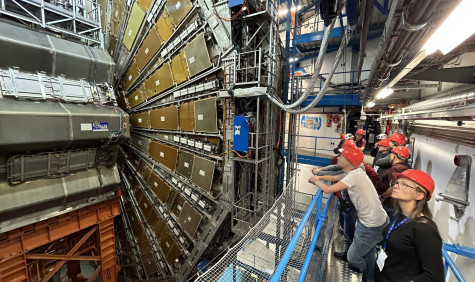The SURF network team having an optimal view on the ATLAS Experiment at CERN
SURF and Nokia achieve data speed of 800Gbit per second on 1.648km network connection
Upgrade of the Large Hadron Collider
The reason for the test is the planned upgrade of CERN's particle accelerator, the Large Hadron Collider, in 2029. This upgrade will lead to sharper measurements, enabling more detailed research into the origin of the universe. This is expected to provide five to seven-and-a-half times more research data than at present. All this data needs to be distributed via various networks, including SURF's network, to universities and research groups in the Netherlands and around the world.
To successfully transport the large amount of data, SURF has optimised the optical network. Nokia tested its latest generation of network cards to assess its performance with this amount of data over the SURF network. The results of the test demonstrate that this part of the SURF network between Amsterdam and Geneva can handle a much higher capacity than previously anticipated.
Rising demand for more bandwidth and network speed
The upgrade of the Large Hadron Collider follows the global increase in data-intensive research, which requires high network speeds, more bandwidth and storage capacity. Research projects such as the Square Kilometre Array, the Einstein Telescope, the Low-Frequency Array and the International Thermonuclear Experimental Reactor are also generating huge data streams that require more network speed than the currently common 100Gbit and 400Gbit per second.
Insights and follow-up testing
Testing an operational network connection over long distances and with real data from the Large Hadron Collider provides unique insights into data transport and storage of large data volumes. SURF regularly conducts these kinds of tests with various network partners. The tests are crucial for improving the infrastructure for data-intensive research.
SURF is working on various innovations to test, optimise and expand the SURF network, the global network nodes, the connected storage capacity and the computing power. The aim is to enable data-intensive research now and in the future.
